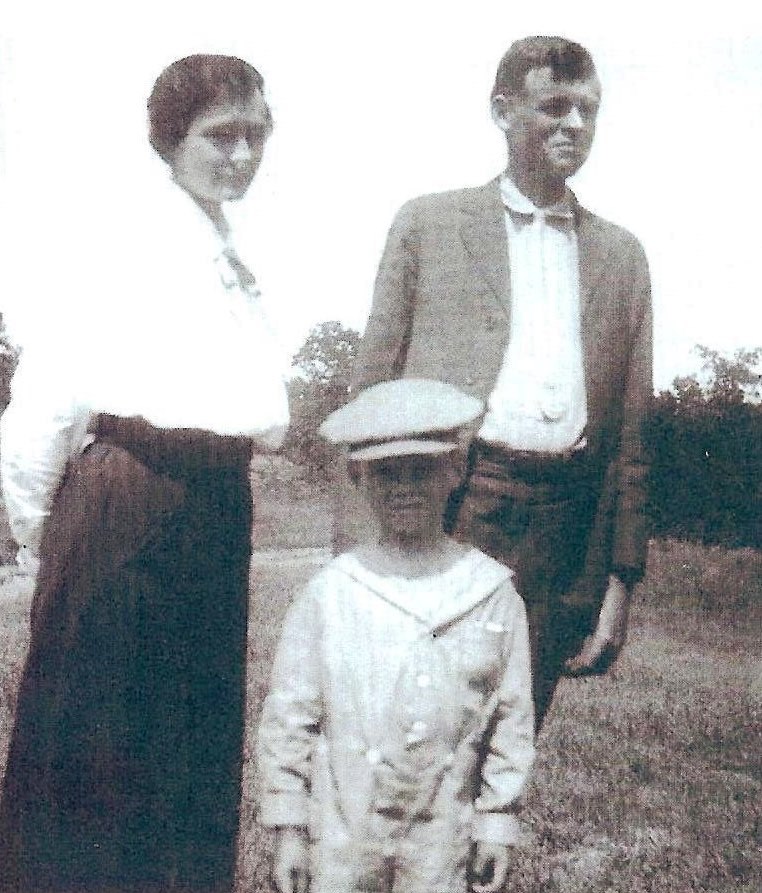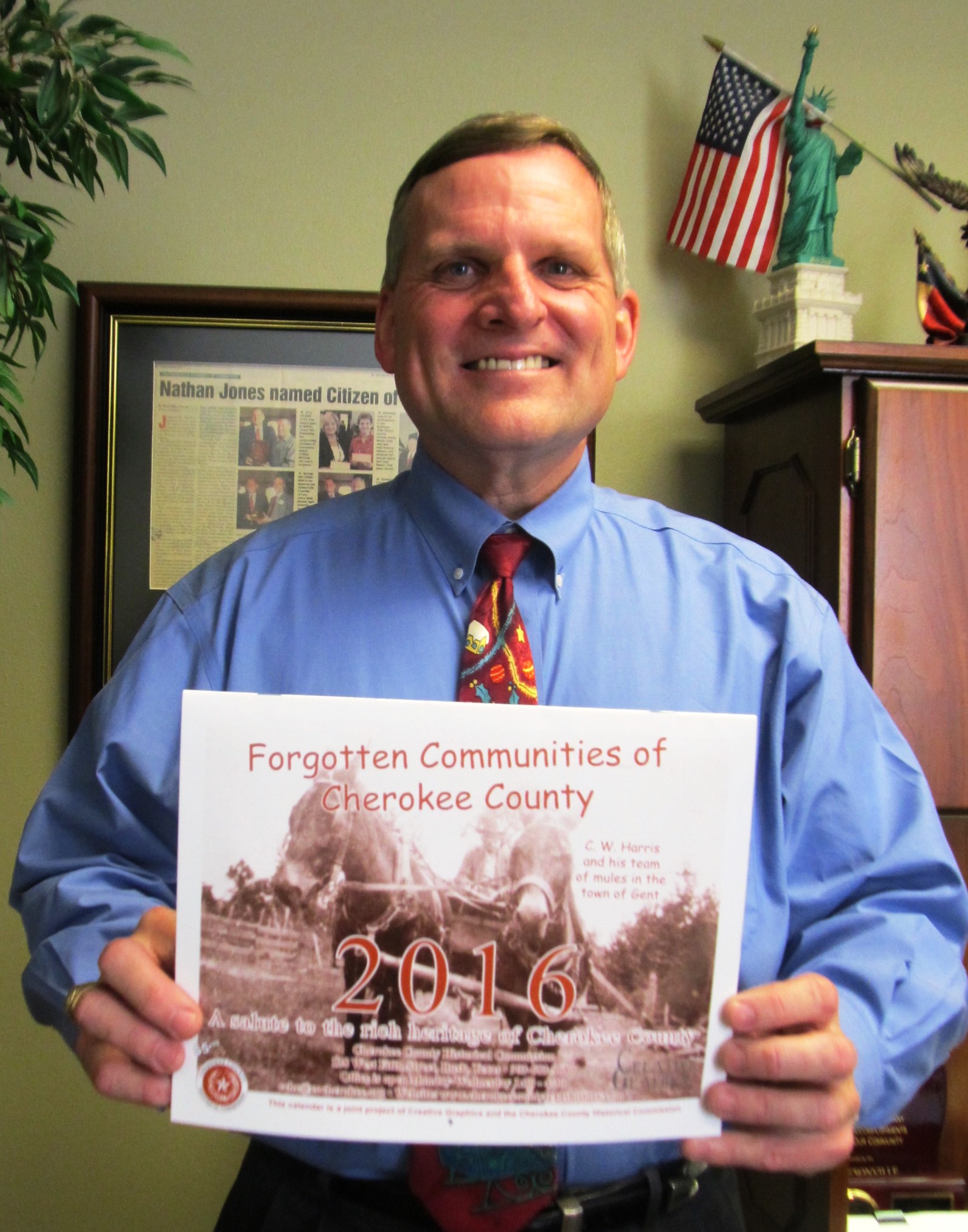Forgotten Communities of Cherokee County
By Deborah Burkett, Chairman, Cherokee County Historical Commission
I'm always intrigued by the back stories-information that comes to light as one conducts research on another topic. When I least expect it, I learn things during oral history interviews which will have relevance to future projects. Such is the case with Fry's Gap and the people who lived there long ago. They are still speaking to us of a forgotten time.
In the newly printed 2016 calendar by the Cherokee County Historical Commission, Fry's Gap is featured as one of many forgotten places in our area. (Note in the accompanying photo at the end of this column Nathan Jones, Austin Bank EVP Regional President of Jacksonville proudly displays his calendar.)
The state historical marker for Fry's Gap states, among other things, that it was a gap in a ridge near Gum Creek headwaters which made a natural trail for early travelers, including Kickapoo Indians. The Fry family settled along the creek in the 1840s. Early industry included Joseph Fry's grist mill and blacksmith shop, as well as Rhome Ragsdale's brickyard. When the railroad came through it used the old trail for the line.
I first learned of this community when I met acclaimed, Big Bend historian, author and musician, Kenneth Baxter Ragsdale. I was part of the book committee working on--A Century of the History of Troup, published by the Troup Genealogical Historical Society.
When asked for a memory, Kenneth shared the following via email, "I was born near a whistle stop called Fry's Gap on I & O Railroad about four miles north of Jacksonville. The railroad of course is long gone. I remember my father taking me to the Gap, flagging the passenger train and riding to Jacksonville. Returning, we would buy a ticket to Fry's Gap, tell the conductor our destination, and he would stop the train to let us off. What service! After dark, my father would either wave a lantern or burn newspapers to stop the train. Days gone by!" (See accompanying photograph for an image of Kenneth as a young boy. He's standing with his mother, Ruth Norman Ragsdale and her brother, Wilmer Norman.)
When I met Kenneth in person I was astounded. I thought I knew him a bit because family and friends had talked about him but I never realized the depth of his accomplishments and the impact he'd made on a larger stage. He came to East Texas in the late 1990s to view a photo exhibit at the Cameron-J Jarvis Troup Municipal Library. The town was buzzing with excitement. Kenneth was going to arrive by plane-one that he would pilot himself. Imagine that! At 80, he became one of only a handful of pilots in aviation history to have earned a license at that age. Then in late 2014 while I was researching the Great Depression, Kenneth's name surfaced on Internet sites. I was looking for Dr. L. T. Cummins's writings about women and their contributions during the Texas Centennial. We had met and shared information but I didn't realize he and Kenneth were contemporaries.
I asked for a quote and L. T. Cummins, Ph. D. of Austin College, and former official Texas State Historian kindly consented, "Ken Ragsdale was a gem of a person. He was a great scholar, an accomplished musician, and a warm human being. Ken was a tireless worker in advancing the cause of Texas history. His important books went great distance to expand our appreciation for the history of this state. Ken's book on the Texas Centennial will stand for many, many decades as the definitive work on the topic."
Two highlights of Kenneth's storied career stand out: In 1964, upon retiring from teaching in Austin he applied for the doctoral program in the History Department at the Univ. of Texas. He was rejected, told that at 48 years of age he was "too old". He was saved by William Goetzmann, a Pulitzer-prize winning historian and director of the newly-formed American Civilization department at the university. He invited Ragsdale to pursue a degree in his department and Kenneth's love of the Big Ben area began.
Another career accomplishment illustrates Ragsdale's penchant for history. While working towards the degree in Goetzmann's department, he also began working part-time as a field director at the Texas State Historical Association located on campus in Battle Hall. In this capacity, Ragsdale was instrumental in creating a railroad-car museum commemorating the Chisholm Trail that traveled all over the U.S. and abroad.
Not bad for a Fry's Gap boy!
In closing, when I asked Kenneth's son, Jeff, to discuss his father's love of Jacksonville and Troup he shared," We all know the old story about a person never forgetting where he or she comes from but in my dad's case, it was particularly true. For him, it was a recognition of the fact that, how he was raised, the people he grew up with, the neighbors he grew to know, the doctors that helped to nurture him back to health, not to mention the fertile land itself, were all indispensable to creating the man he was to become. As a historian, he understood that one's personal story is never lived in isolation or out of context but is, instead, inextricably tied to the environment which gives it foundation, and in my dad's life, he traces it all the way back to Jacksonville and Troup and the beloved Piney Woods he forever called home."

Ken, his mother Ruth Norman Ragsdale, and her brother Wilmer
